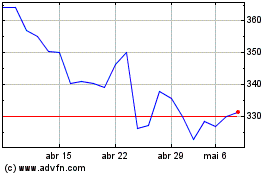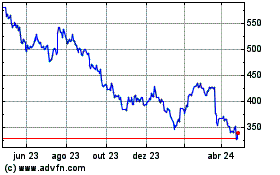Gucci's Sales Fell 34% in First Half
28 Julho 2020 - 5:03PM
Dow Jones News
By Matthew Dalton
PARIS -- Gucci's sales and operating profit fell sharply in the
first half, hit hard by lockdowns imposed world-wide to fight the
coronavirus pandemic.
The Italian fashion house appeared to lose market share against
two of its main rivals, Louis Vuitton and Dior, the French luxury
brands owned by LVMH Moët Hennessy Louis Vuitton. Gucci's revenue
fell 34% to EUR3.1 billion ($3.6 billion) in the half, its parent
company, the Paris-based Kering SA, reported Tuesday. Sales at
LVMH's fashion and leather goods division -- the bulk of which is
Louis Vuitton and Dior -- were down just 23% in the half.
Gucci's operating profit slid 51% to EUR929 million.
Gucci has been struggling over the past year with slowing
momentum, after three years of breakneck growth under its creative
director Alessandro Michele. Mr. Michele's more recent fashion
shows have displayed a less eclectic aesthetic than the one that
propelled the brand in years past, when he mixed
professional-sports logos with Renaissance-era silhouettes and sent
models down the runway carrying replicas of their own heads.
The Italian fashion house, however, was better able to control
costs in the first half than its French rivals, as lockdowns
imposed during the pandemic forced boutiques around the world to
shut for months at a time. That is partly because, unlike LVMH,
Gucci relies heavily on third-party production from a network of
small manufacturers clustered around Gucci's headquarters in the
Florence region.
The structure makes it easier for Gucci to cut costs by
canceling orders to these suppliers. Louis Vuitton and Dior own
most of the factories that produce their goods.
"The fact that we are less internalized in production does
help," said Jean-Marc Duplaix, Kering's chief financial officer.
"Sometimes it can be a weakness and sometimes it's a strength."
Gucci, however, has been moving to take control of more of its
production by buying up suppliers and building new factories. The
goal is to be able to bring new products to market faster and
ensure that it has enough production to meet surging demand for
leather goods and other luxury products -- assuming demand does
recover after the pandemic. Mr. Duplaix said the economic crisis
hasn't prompted Kering to reconsider that strategy.
Overall sales at Kering, which also owns Saint Laurent,
Balenciaga and Bottega Veneta, fell 30% to EUR5.4 billion, while
net income was EUR273 million. Recurring net profit fell 53%, far
less than at LVMH.
The quarter displayed another strong performance from Bottega
Veneta, which until recently was Kering's worst-performing brand.
The brand, known for its handbags made with the intrecciato weaving
technique, replaced its longtime creative director in 2018 with the
young British designer Daniel Lee.
First-half sales at Bottega Veneta were down 8.4%.
Write to Matthew Dalton at Matthew.Dalton@wsj.com
(END) Dow Jones Newswires
July 28, 2020 15:48 ET (19:48 GMT)
Copyright (c) 2020 Dow Jones & Company, Inc.
Kering (EU:KER)
Gráfico Histórico do Ativo
De Mar 2024 até Abr 2024

Kering (EU:KER)
Gráfico Histórico do Ativo
De Abr 2023 até Abr 2024
